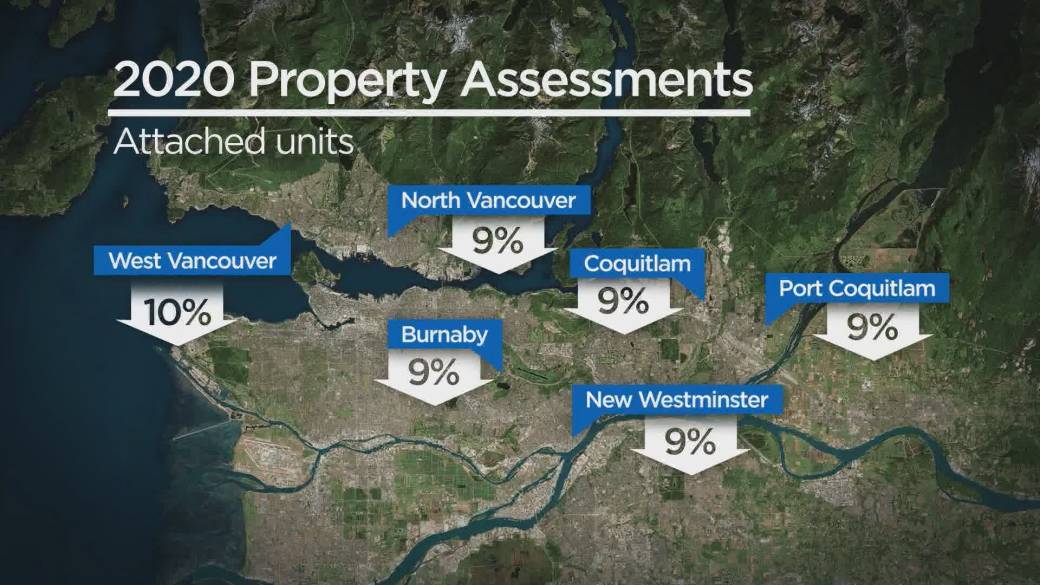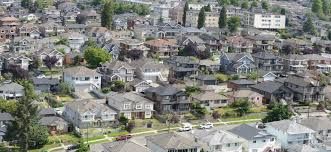DESIBUZZCanada
Events Listings
Dummy Post

International Day Of Yoga To Be Virtually Celebrated Saturday At 4pm

CANCELLED: Coronavirus Fears Kills Surrey’s Vaisakhi Day Parade

ADVERTISE WITH US: DESIBUZZCanada Is The Most Read South Asian Publication Online

SURREY LIBRARIES: Get Technology Help At Surrey Libraries

WALLY OPPAL: Surrey Police Transition Update On Feb. 26

GONE ARE THE DAYS - Feature Documentary Trailer

Technology Help At Surrey Libraries

Birding Walks

Plea Poetry/short Story : Youth Contest

International Folk Dancing Drop-in Sessions
Property Assessments Show Lower Mainland Home Prices Spiralling Downwards
- January 4, 2020

VANCOUVER – Judging from the latest property assessments – home prices in the lower mainland have fallen steeply over the last year and will continue to do so in the future.
More than 1,040,000 properties throughout the Lower Mainland can expect to receive their 2020 assessment notices which reflect market value as of July 1, 2019.
"The Lower Mainland residential real estate market continues to see signs of moderation," says BC Assessment Deputy Assessor Brian Smith. "Depending on your location and property type, you will experience a different level of change on your 2020 Assessment Notice. Homes located in Whistler and Pemberton can expect a minimal increase in their assessments whereas the rest of the region will likely experience a reduced assessment value."
As B.C.'s trusted provider of property assessment information, BC Assessment collects, monitors and analyzes property data throughout the year.

Overall, the Lower Mainland region’s total assessments have reduced from about $1.48 trillion in 2019 to about $1.41 trillion this year. A total of $18.6 billion of the region’s updated assessments is from new construction, subdivisions and rezoning of properties.
BC Assessment’s website at bcassessment.ca includes more details about 2020 assessments, property information and trends such as lists of 2020’s top valued residential properties across the province.
“Property owners can find a lot of valuable information on our website including answers to many assessment-related questions, but those who feel that their property assessment does not reflect market value as of July 1, 2019 or see incorrect information on their notice, should contact BC Assessment as indicated on their notice as soon as possible in January,” says Deputy Assessor Brian Smith.
"It is important to understand that changes in property assessments do not automatically translate into a corresponding change in property taxes," explains Smith. "As noted on your Assessment Notice, how your assessment changes relative to the average change in your community is what may affect your property taxes."

Facts on B.C. Property Assessments and the 2020 Assessment Roll
- Total number of properties on the 2020 Roll is 2,091,135, an approximate 1.06% increase from 2019.
- Total value of real estate on the 2020 Roll is about $1.94 trillion, a decrease of nearly 2.5% from 2019.
- Total amount of ‘non-market change’, including new construction, rezonings and subdivisions is approximately $27.1 billion, a decrease of almost -8.63% from the 2019 revised roll of $29.6 billion.
- In B.C., approximately 88% of all properties are classified with some residential (Class 1) component. This equates to $1,462,895,234,775 of the value on the total provincial roll.
- Over 98% of property owners typically accept their property assessment without proceeding to a formal, independent review of their assessment.
- Assessments are the estimate of a property’s market value as of July 1, 2019 and physical condition as of October 31, 2019. This common valuation date ensures there is an equitable property assessment base for property taxation.
- Changes in property assessments reflect movement in the local real estate market and can vary greatly from property to property. When estimating a property’s market value, BC Assessment’s professional appraisers analyze current sales in the area, as well as considering other characteristics such as size, age, quality, condition, view and location.
- Real estate sales determine a property’s value which is reported annually by BC Assessment. Local governments and other taxing authorities are responsible for property taxation and, after determining their own budget needs this spring, will calculate property tax rates based on the assessment roll for their jurisdiction.
- BC Assessment’s assessment roll provides the foundation for local and provincial taxing authorities to raise over $8 billion in property taxes each year. This revenue funds the many community services provided by local governments around the province as well as the K-12 education system.
- BC Assessment’s website provides a listing of property assessments and sales to help property owners understand their property's market value and provide comparable sales information. Go to bcassessment.ca and use “Find your property assessment”. For more information on the 2020 Assessment Roll and regional and province-wide real estate market trends including lists of the province’s top valued residential properties, please visit www.bcassessment.ca and click on the “Property Information & Trends” link.

The table below indicates the Lower Mainland’s estimated range of percentage changes to 2020 assessment values by property type compared to 2019. Please note property assessments may vary by jurisdiction or municipality within the region, which includes all of Greater Vancouver, the Fraser Valley as well as the Sea to Sky area and Sunshine Coast.
| Property Type | Greater Vancouver Areas | Fraser Valley Areas |
| Residential Single Detached Homes | -15% to 0% | -15% to +5% |
| Residential Strata Units | -15% to 0% | -15% to 0% |
| Commercial | -15% to +20% | -5% to +25% |
| Industrial | -5% to +20% | 0% to +25% |
The summaries below provides estimates of typical 2019 versus 2020 assessed values of properties throughout the region.
These examples demonstrate market trends for single-family residential properties by geographic area:


| Single Family Home Changes by Community | 2019 Typical Assessed Value | 2020 Typical Assessed Value | % Change |
| City of Vancouver | $1,755,000 | $1,568,000 | -11% |
| University Endowment Lands | $5,904,000 | $4,946,000 | -16% |
| City of Burnaby | $1,512,000 | $1,363,000 | -10% |
| City of Coquitlam | $1,254,000 | $1,121,000 | -11% |
| City of Port Coquitlam | $969,000 | $875,000 | -10% |
| City of Port Moody | $1,342,000 | $1,192,000 | -11% |
| City of New Westminster | $1,147,000 | $1,054,000 | -8% |
| City of North Vancouver | $1,510,000 | $1,351,000 | -11% |
| District of North Vancouver | $1,616,000 | $1,479,000 | -9% |
| District of West Vancouver | $2,803,000 | $2,356,000 | -16% |
| District of Squamish | $927,000 | $930,000 | 0% |
| Resort Municipality of Whistler | $1,935,000 | $2,033,000 | +5% |
| Village of Pemberton | $829,000 | $873,000 | +5% |
| Bowen Island Municipality | $967,000 | $933,000 | -4% |
| Village of Lions Bay | $1,493,000 | $1,384,000 | -7% |
| Village of Belcarra | $1,461,000 | $1,318,000 | -10% |
| Village of Anmore | $2,134,000 | $1,989,000 | -7% |
| Town of Gibsons | $675,000 | $657,000 | -3% |
| District of Sechelt | $605,000 | $568,000 | -6% |
| City of Surrey | $1,042,000 | $1,010,000 | -3% |
| City of White Rock | $1,310,000 | $1,196,000 | -9% |
| City of Richmond | $1,532,000 | $1,322,000 | -14% |
| City of Delta | $1,003,000 | $917,000 | -9% |
| Township of Langley | $971,000 | $922,000 | -5% |
| City of Langley | $862,000 | $809,000 | -6% |
| City of Abbotsford | $758,000 | $727,000 | -4% |
| City of Chilliwack | $613,000 | $590,000 | -4% |
| City of Maple Ridge | $820,000 | $768,000 | -6% |
| City of Pitt Meadows | $871,000 | $821,000 | -6% |
| District of Mission | $698,000 | $652,000 | -7% |
| District of Kent | $511,000 | $494,000 | -3% |
| District of Hope | $416,000 | $410,000 | -1% |
| Harrison Hot Springs | $608,000 | $577,000 | -5% |
These examples demonstrate market trends for strata residential properties (e.g. condominiums) by geographic area for select urban areas:
| Strata Home Changes by Community | 2019 Typical Assessed Value | 2020 Typical Assessed Value | % Change |
| City of Vancouver | $740,000 | $686,000 | -7 |
| City of Burnaby | $623,000 | $569,000 | -9 |
| City of Coquitlam | $591,000 | $537,000 | -9 |
| City of Port Coquitlam | $533,000 | $486,000 | -9 |
| City of Port Moody | $648,000 | $615,000 | -5 |
| City of New Westminster | $547,000 | $500,000 | -9 |
| City of North Vancouver | $707,000 | $656,000 | -7 |
| District of North Vancouver | $758,000 | $693,000 | -9 |
| District of West Vancouver | $1,288,000 | $1,156,000 | -10 |
| District of Squamish | $584,000 | $562,000 | -4 |
| Resort Municipality of Whistler | $957,000 | $919,000 | -4 |
| City of Surrey | $522,000 | $497,000 | -5 |
| City of White Rock | $478,000 | $461,000 | -4 |
| City of Richmond | $654,000 | $600,000 | -8 |
| City of Delta | $568,000 | $545,000 | -4 |
| Township of Langley | $561,000 | $531,000 | -5 |
| City of Langley | $396,000 | $369,000 | -7 |
| City of Abbotsford | $356,000 | $329,000 | -7 |
BC Assessment’s website at bcassessment.ca includes more details about 2020 assessments, property information and trends such as lists of 2020’s top valued residential properties across the province.











